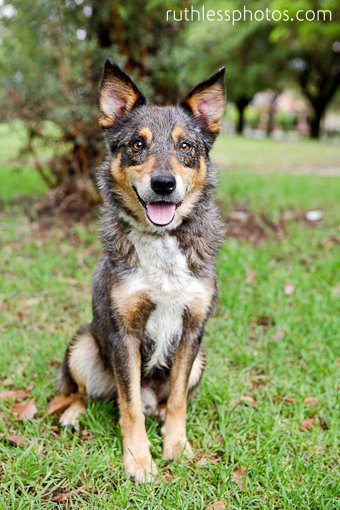7 Tips for Improving Your Dog Recall
This post is part of the McGreevy seminar series. Click here for the index.
One of Paul McGreevy’s training insights was his list of “7 tips for improving your dog recall”. My notes detail his list as the below, however I may have used my own words to describe some of his tips!
- Reward continuously until your pup is skeletally mature
- Reward intermittently after your pup is skeletally mature
- If dog doesn’t want to come back, increase the reward
One of the focuses of McGreevy’s overall series was to reward with what the dog wants and likes, not what you think it should want and like. Dogs have personal tastes and they need to be rewarded with what they want – because otherwise the reward runs the risk of not actually serving as reinforcement (i.e. something that increases the likelihood of the behaviour occurring).

Clover recalling to me and waiting for her reward.
- Use the best ever jackpots
Coming back should be highly rewarded, and including jackpots in your reward schedule is a good practice to secure a reliable recall. - Run backwards when dog approaches
As we know, dogs like to chase things, and dogs like fun. In this way, running backwards is a fun game to the dog, and also changes things up, making the recall process more exciting. - Use release command
This is a good tip that is perhaps under-emphasised. Dogs need to know when they need to come back, and then when they’re free to do their own thing. If they are confused about this, then there is a risk of tarnishing the recall.

Clover, having received a release command, sets off.
- Use the premack principle
The premack principle is basically that behaviours that the dog does not want to do can be reinforced by behaviours the dog does want to do. That is, you can use what your dog wants to do as rewards. So if your dog wants to run, jump, swim, etc, you can recall your dog and then reward him by sending him to run, jump, swim, etc.

A blurry Clover recalls
Though these do provide food for thought, I am not sure if I would put these as the top 7 most important things for improving a recall. I also do not think that this list suits the lay-person, the casual dog owner. Considering these suggestions, and my past experience, I am pleased to announce my very first guest post at AllYouNeedIsLists.com. This post covers my 7 tips for improving your dog recall, written for the dog-owner and not the dog-enthusiast.
Further reading: Seven Steps to Off-Leash Reliability
This post is part of the McGreevy seminar series. Click here for the index.


